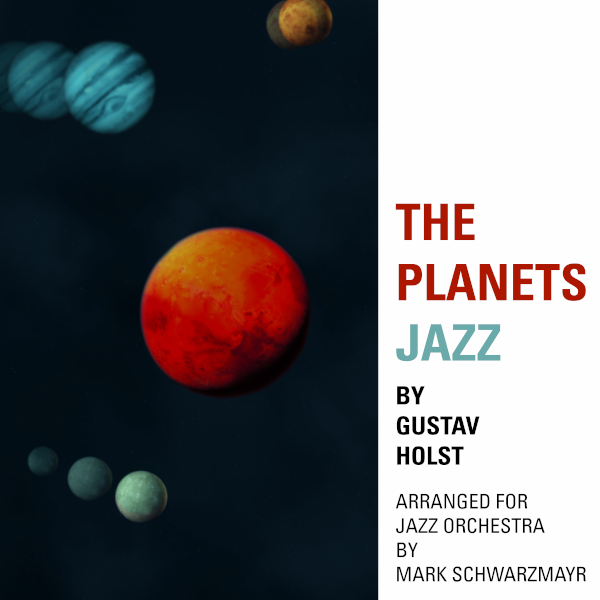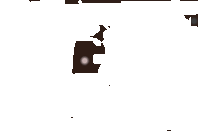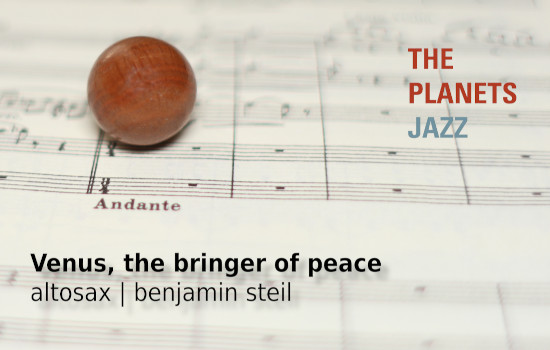buy the CD: listen
|
|||||
Infotext - Linernotes
Big Band is considered the most versatile Jazz ensemble of today’s time. It offers a broad spectrum of acoustic colors which makes it the perfect vessel for the composition‘s performance. Improvisation is an essential element of Jazz. This means that every movement/planet can be performed by specific soloists, matching the varying themes and highlighting their individuality. Fully notated passages, which melodically and harmonically pick up the motives created by Holst, are balanced out with contrasting, improvised elements. 2024 |
|||||
instrumentation altosax 1, doubles on flute, sopransax, bass-clarinet, solo on "Jupiter" altosax 2, doubles on flute, clarinet tenorsax 1, doubles on clarinet tenorsax 2, doubles on flute baritonsax, doubles on clarinet, bass-clarinet trumpet 1, several mutes, doubles on flugelhorn trumpet 2, several mutes, doubles on flugelhorn trumpet 3, several mutes, doubles on flugelhorn trumpet 4, several mutes, doubles on flugelhorn trumpet 5 several mutes, doubles on flugelhorn trombone 1, several mutes trombone 2, several mutes trombone 3, several mutes trombone 4 (basstrombone), several mutes keys, acousic/electric piano/synth/organ, solo on "Mars" bass, acoustic/electric bass, low b-string prefered guitar, jazz-guitar, electric guitar, solo on "Uranus" drums, jazz-drumset, solo on "Mercury" and "Mars" percussion, latinpercussion, cymbals, belltree, triangle, solo on "Mercury" additional soloist Planet Mars, bringer of war: electronics & loops Planet Venus, bringer of peace: altosax Planet Mercury, the winged messenger: flute Planet Jupiter, bringer of jollity: tenorsax Planet Saturn, the bringer of old age: trombone Planet Uranus, the magician: trumpet Planet Neptune, the mystic: flugelhorn |
|||||
the planets-jazzorchestra conducted by Mark Schwarzmayr
|
Benjamin
Steil trumpets trombones Sven
Adelberger rhythm section Mark
Schwarzmayr (keys) |
||||
|
3rd Planet (Earth) of our
Solarsystem, |
||||
| my
thougts:
|
|
||||
|
Thank
you: Such a project would never have been possible without the many people who have played their parts in it realization Thanks to Gustav Holst for his fantastic composition. I cannot bow low enough Thank you to all the musicians who brought my vision to life with heir performances. With you as my crew, I can fly beyond the solar system. Without the support of my family and friends THE PLANETS JAZZ would never have gotten of the launching pad. Thank you all very much. A special thanks to my wife Stephanie. Travelling throuh time an space is teamwork and you always need a wingman (wingwoman) you can trust.
|
||||
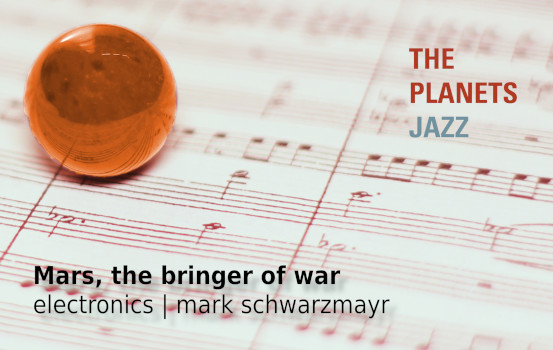 |
|||||
MARS, the bringer of war, The first and best-known planet in Gustav Holst's work is Mars. Astronomically this is not quite correct, as Mercury is actually the innermost planet orbiting the sun. The planet Mars has the character of a march, which is in the unusual time signature 5/4. The opening of "the planets" is characterized by the drama of the mechanized war in the original. For this reason, the first movement of "THE PLANETS JAZZ" is not accompanied by a classical soloist. Instead, the big band plays to sampled loops and electronics. The samples open the piece, relentlessly setting the 5/4 groove, a "machine" that is difficult to stop. The contrast between the rigid electronic framework and the human element is deliberately chosen. The jazz drum set begins the dialog with the machine. Gradually, melodies and themes emerge from the carpet of sound. The big band sits down on the relentless war beat. The recurring 5/4 basic motif in combination with many and the wide dynamic range from soft to absolute fortissimo give Mars the force of a true and defensive god of war. The entire programming was done by the arranger Mark Schwarzmayr. |
|||||
|
|||||
|
|||||
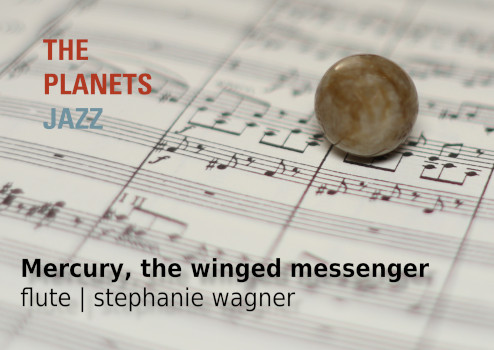 |
|||||
MERCURY, the winged messenger is the flute feature. The smallest but also the fastest planet in the solar system and, at up to 450 degrees, also quite "warm". Mercury thus became a fast 6/8 Latin number that moves through the jazz orbit both polyharmonically and polyrhythmically.
In 2011, she was
awarded the Jazz Prize of the City of Worms as an
outstanding instrumentalist at a high technical level, as
well as for her innovative work in various formations, in
which she unmistakably brings her personality to bear.
She has performed with Marilyn Mazur, Florian Weber,
Wilson de Oliviera, Volker Engelberth, Steffen Weber,
Dirk Raufeisen, Martin Auer, the Söhne Mannheims, Tony
Lakatos, Norbert Dömling etc.
|
|||||
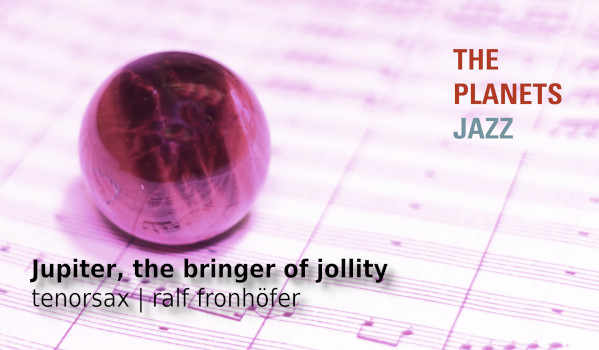 |
|||||
JUPITER, the bringer of jollity, This planet is the largest in our solar system and the JUPITER set is also the largest. Radio is used for coltranesque passages and swing sections. Incidentally, Jupiter has the largest hurricane in the solar system (over 200 years old, 1.5 times the diameter of the Earth), which is why there are two extended solo passages for the tenor sax in this movement. "There is a storm coming". Jupiter is the feature for the tenor saxophone, which is in the hands of Ralf Fronhöfer. Ralf Frohnhöfer
is one of the up-and-coming saxophonists of his
generation on the Rhine-Main jazz scene. His style is
characterized by sonorous playing with a warm, sunny tone
and a great sense of harmony and melody. He performs his
pieces emotionally, almost lyrically, meticulously
working out details and subtle nuances. He has played in
the Bundesjugendjazzorchester, the HR Big Band and many
other renowned formations. Prominent artists with whom
Frohnhöfer has worked on various projects include Randy
Brecker, Ack van Rooyen, James Morrison, Tom Gäbel, Max
Mutzke, ZAZ, Jane Monheit, Frankfurt Radio Big Band, Jim
McNeely, Mike Holober, Jörg Achim Keller and many more.
He has also worked on various television productions for
ARD, ZDF, SWR, HR and ProSieben, including Schlag den
Raab and Bundesvision Song Contest. |
|||||
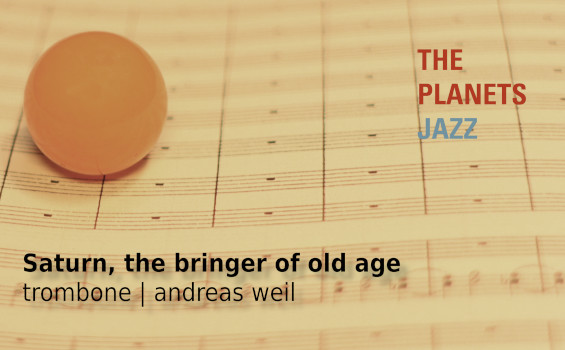 |
|||||
SATURN, the bringer of old age is designed as a trombone feature. Slow, menacing chords from the Rhodes, soundscapes of mutes and woodwinds and solo passages in the style of Duke Ellington characterize this movement. The soloist is Andreas Weil on solo trombone. Andreas Weil studied trombone in Frankfurt and Munich. Since June 2003 he has been solo trombonist with the State Police Orchestra in Mainz, regular engagements at the Frankfurt Opera, Mainz State Theater, Darmstadt State Theater, Wiesbaden State Theater, musical productions throughout Germany...
|
|||||
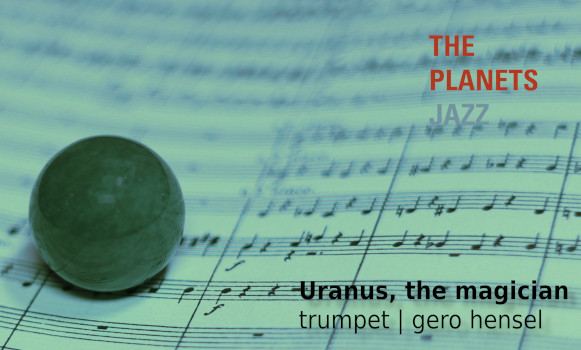 |
|||||
URANUS, the magician is Neptune's direct neighbor. Its blue-green glow comes from its unique cloud layers of methane. As a planet, it is one of the ice planets. Musically, Gustav Holst built his movement from a minimal motif. This motif forms the basis for a shuffle-style journey to Uranus. The solo part is played by the trumpet, interpreted by Munich musician Gero Hensel. Gero Hensel studied jazz trumpet in Mainz and then master jazz trumpet and master jazz composition in Munich. He is active as a freelance jazz trumpeter throughout Germany (e.g. concerts in the Mercedes-Benz Arena Berlin, appearance in the ARD television service, studio recordings for Felix Jaehn). In 2019, he was awarded second prize at the Kurt Maas Jazz Award. He is part of various ensembles and also leads his own projects, e.g. the "Gero Hensel Ensemble", with which he concentrates exclusively on his own music and his own compositions.
|
|||||
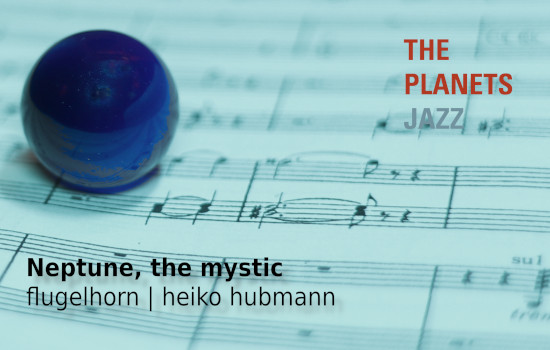 |
|||||
NEPTUNE, the mystic, At the very other end of our solar system, Neptune moves in its quiet orbit. In THE PLANETS JAZZ suite, the quiet movement is the feature for flugelhorn. Slow 5/4 atmospheric grooves and complex chords form the dark, mystical mood. An extended improvised solo unfolds in the inner core. Before we leave the solar system, there is a 5-part canon by the flugelhorn section. The solo flugelhorn is in the hands of Heiko Hubmann. Heiko Hubmann studied jazz trumpet in Mainz and Cologne. He works as a live and studio musician for musicals, state theaters and radio stations. He has played with artists such as Bobby Shew, Herb Geller, Bob Mintzer, Kenny Wheeler, Paul Kuhn, Pe Werner, Vicky Leandros, Xavier Naidoo, Marc Marshall etc. Musically, he impresses with his great melodic flair and sound quality.
|
|||||
|
|||||

|
|||||
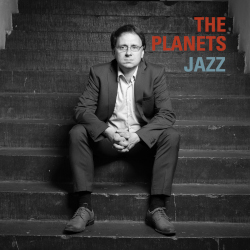
|
|||||
